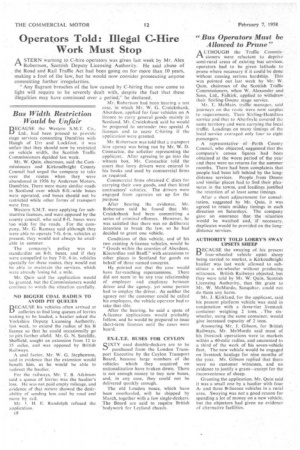Operators Told: Illegal C-Hire Work Must Stop
Page 56

If you've noticed an error in this article please click here to report it so we can fix it.
A STERN warning to C-hire operators was given last week by Mr. Alex Robertson, Scottish Deputy Licensing Authority. He said abuse of the Road and Rail Traffic Act had been going on for more than. 10 years,
making a fool of the law, but he would now consider prosecuting anyone committing further irregularities.
"Any flagrant breaches of the law caused by C-hiring that nOw come to light will require to be severely dealt with, despite the fact that these illegalities may have continued over a period," he declared.
Mr. Robertson had been hearing a test case, in which Mr. W. G. Cruickshank, Aberdeen, applied for four vehicles on A licence to carry general goods mainly in Scotland. Mr. Cruickshank said he would be prepared to surrender two special A licences and to ceaSe C-hiring if the application were granted.
Mr. Robertson was told that a transport hire agency was being run by Mr. W. D. Connaehie, the solicitor representing the applicant. After agreeing to go into the witneis box, Mr. Connachie told the court that lorry drivers were entered in his books and used by commercial firms as required.
Commercial firms obtained C discs for carrying their own goods. and then hired contractors' vehicles. The drivers were engaged from agencies set up for the purpose
After hearing the evidence, Mr. Robertson said he found that Mr. Cruickshank had been committing a series of criminal offences. However, he was satisfied that there was no deliberate intention to break the law, so he had decided to grant one vehicle.
Conditions of this vehicle, and of his two existing A-licence vehicles, would be "Goods within the counties of Aberdeen, Kincardine and Banff," with extensions to other places in Scotland for goods on behalf of three named concerns.
He pointed out that the case would have far-reaching repercussions. There did not seem to be any true relationship of employer and employee between driver and the agency. yet' some person had to employ the driver. As neither the agency nor the customer could be called his employers, the vehicle operator had to take that o5le.
After the hearing, he said a spate of A-licence applications would probably follow, and he would be prepared to issue short-term licences until the cases were heard.
































































































































